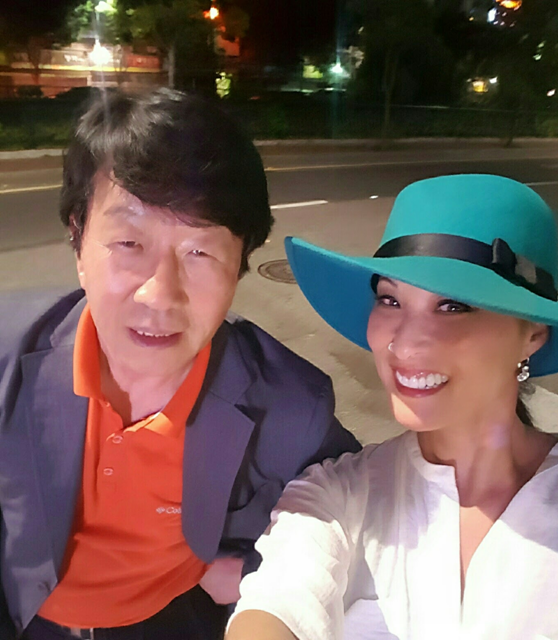hankyoreh
Links to other country sites 다른 나라 사이트 링크
[Interview] Adoptees from Korea left ‘stateless’, and searching for their roots

“There are a lot of adoptees like me who were adopted and grew up in the US but who haven’t gotten US citizenship. We desperately need attention and support from our home country’s government.”
This was the urgent plea from adoptee Joy Alessi, 50, who arrived in South Korea early this October. Alessi was entrusted to the Yeongsaengwon orphanage in Munsan, Paju, on July 20, 1966, just a day or two after her birth. The following March, she was adopted in the US through the Holt Children’s Welfare Association at the age of seven months. Her visit was her first time in her homeland in 49 years.
Don’t children automatically obtain citizenship when adopted in the US? According to Alessi, they do not. Over 160,000 South Korean children have been adopted to the US since the Korean War, but an estimated 15,000 to 18,000 do not have US citizenship.
Upon her arrival, Alessi began visiting several places to find evidence of herself and her birth parents. She first tried to visit Yeongsaengwon, but only an empty lot remains today. She also met with members of the Hanmaeum Association, a friendship group for those formerly associated with Yeongsaengwon. She visited adoption agencies and administrative agencies - but all in vain.
Alessi first learned she was not a US citizen at age 25, when she attempted to apply for US passport to travel to Mexico. She was baffled to hear that she couldn’t be issued a passport because she wasn’t a US citizen. It was an utter repudiation of her identity as someone who had until then believed herself to be a citizen. “It was really stunning,” she said. The immigration bureau warned that she could be deported.
After a tortuous process, Alessi checked her orphan registration record and discovered her South Korean citizenship still stood. But going to the consulate and applying for a South Korean passport was a painful process. She had to fill out the application documents in Korean. Having growing up in a US household with only an English-language education, she didn’t understand a word of written Korean. Only after some difficulties was she finally able to obtain her South Korean passport.
Life in the US was insecure after that. To get a job, she had to present her South Korean passport and adoption papers and explain her situation. Fortunately, her diligence landed her a job as a flight attendant, but she still had to regularly renew her long-term sojourn visa. Voting in presidential and other elections was out of the question.

An estimated 15,000-18,000 stateless adoptees from Korea
Why is it that South Korea is believed to account for the most stateless adoptees? It’s not simply because of the sheer scale of adoptions. A bigger factor was the sloppy handling of adoption procedures - a byproduct of the South Korean government viewing adoption as a way of earning foreign currency in the wake of the Korean War.
A representative example was the simplification of adoption procedures to allow them to take place through document alone. The US automatically confers citizenship on children when the adoptive parents go to the country in question, meet them, and bring them back. But in cases of adoptions where the parents don’t visit in person, they have to go through “re-adoption” procedures in the US, or the child has to become naturalized when they turn 15 to gain US citizenship. When parents neglect the procedure - perhaps believing it done once the child has been placed in their care - the child ends up “lost” internationally. It’s like a second scar being visited on them.
“I still do not have US Citizenship. This is a large issue left to be resolved here in the US,” she said. But she still holds on to her second scar - her South Korean citizenship. Her hope is to find her roots, and to help other “lost” international adoptees facing their own difficulties.
“I hope that anyone who knows even the slightest thing about my birth will not hesitate to contact me,” she said.
The Global Overseas Adoptees’ Link and Korea Adoption Services are currently carrying out a study called AND (Overseas Adoptee Nationality Survey and Study of Possible Support Measures), which investigates whether Korean-born adoptees have gained US citizenship.
“There actually was a case a few years ago of a Korean adoptee in their twenties who belatedly found out they were stateless and committed suicide from the shock,” said tammy ko Robinson, a Hanyang University professor participating in the study.
Robinson, herself an adoptee, said, “This sort of thing happens in other adopting countries besides the US. But no country has accurate statistics on it.”
Robinson noted that a bill for an Adoptee Citizenship Act to help stateless adoptees was put before the US Senate in Nov. 2015.
“As a first step, South Korea needs to conduct an accurate survey on the number of adoptees who are lost internationally and help the aid legislation go through,” she said.
By Kim Bo-geun, senior staff writer
Please direct questions or comments to [english@hani.co.kr]

Editorial・opinion
![[Column] Has Korea, too, crossed the Rubicon on China? [Column] Has Korea, too, crossed the Rubicon on China?](https://flexible.img.hani.co.kr/flexible/normal/500/300/imgdb/original/2024/0419/9317135153409185.jpg) [Column] Has Korea, too, crossed the Rubicon on China?
[Column] Has Korea, too, crossed the Rubicon on China?![[Correspondent’s column] In Japan’s alliance with US, echoes of its past alliances with UK [Correspondent’s column] In Japan’s alliance with US, echoes of its past alliances with UK](https://flexible.img.hani.co.kr/flexible/normal/500/300/imgdb/original/2024/0419/2317135166563519.jpg) [Correspondent’s column] In Japan’s alliance with US, echoes of its past alliances with UK
[Correspondent’s column] In Japan’s alliance with US, echoes of its past alliances with UK- [Editorial] Does Yoon think the Korean public is wrong?
- [Editorial] As it bolsters its alliance with US, Japan must be accountable for past
- [Guest essay] Amending the Constitution is Yoon’s key to leaving office in public’s good graces
- [Editorial] 10 years on, lessons of Sewol tragedy must never be forgotten
- [Column] A death blow to Korea’s prosecutor politics
- [Correspondent’s column] The US and the end of Japanese pacifism
- [Guest essay] How Korea turned its trainee doctors into monsters
- [Guest essay] As someone who helped forge Seoul-Moscow ties, their status today troubles me
Most viewed articles
- 1[Column] The clock is ticking for Korea’s first lady
- 2Samsung barricades office as unionized workers strike for better conditions
- 3After 2 months of delayed, denied medical care, Koreans worry worst may be yet to come
- 4[Correspondent’s column] In Japan’s alliance with US, echoes of its past alliances with UK
- 5[Column] Has Korea, too, crossed the Rubicon on China?
- 6Hong Se-hwa, voice for tolerance whose memoir of exile touched a chord, dies at 76
- 7All eyes on Xiaomi after it pulls off EV that Apple couldn’t
- 8US overtakes China as Korea’s top export market, prompting trade sanction jitters
- 9[Photo] Smile ambassador, you’re on camera
- 10[Guest essay] How Korea turned its trainee doctors into monsters